新概念英语第一册第85课Lesson85课文单词知识点
- 格式:doc
- 大小:97.00 KB
- 文档页数:1
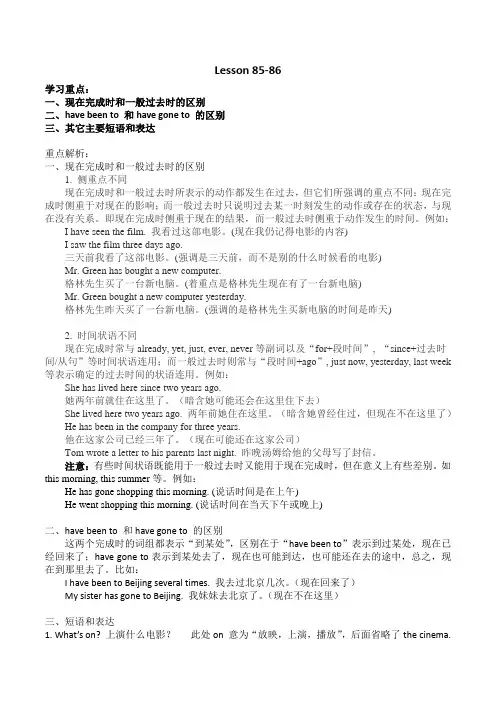
Lesson 85-86学习重点:一、现在完成时和一般过去时的区别二、have been to 和have gone to 的区别三、其它主要短语和表达重点解析:一、现在完成时和一般过去时的区别1. 侧重点不同现在完成时和一般过去时所表示的动作都发生在过去,但它们所强调的重点不同:现在完成时侧重于对现在的影响;而一般过去时只说明过去某一时刻发生的动作或存在的状态,与现在没有关系。
即现在完成时侧重于现在的结果,而一般过去时侧重于动作发生的时间。
例如:I have seen the film. 我看过这部电影。
(现在我仍记得电影的内容)I saw the film three days ago.三天前我看了这部电影。
(强调是三天前,而不是别的什么时候看的电影)Mr. Green has bought a new computer.格林先生买了一台新电脑。
(着重点是格林先生现在有了一台新电脑)Mr. Green bought a new computer yesterday.格林先生昨天买了一台新电脑。
(强调的是格林先生买新电脑的时间是昨天)2. 时间状语不同现在完成时常与already, yet, just, ever, never等副词以及“for+段时间”, “since+过去时间/从句”等时间状语连用;而一般过去时则常与“段时间+ago”, just now, yesterday, last week 等表示确定的过去时间的状语连用。
例如:She has lived here since two years ago.她两年前就住在这里了。
(暗含她可能还会在这里住下去)She lived here two years ago. 两年前她住在这里。
(暗含她曾经住过,但现在不在这里了)He has been in the company for three years.他在这家公司已经三年了。
(现在可能还在这家公司)Tom wrote a letter to his parents last night. 昨晚汤姆给他的父母写了封信。
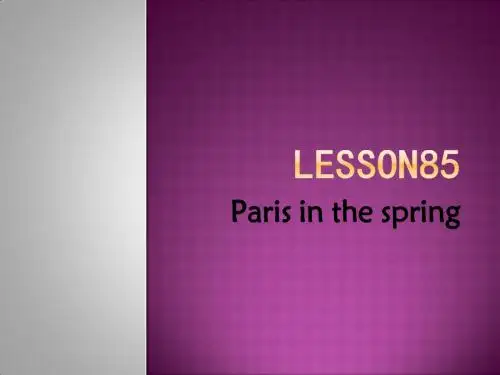
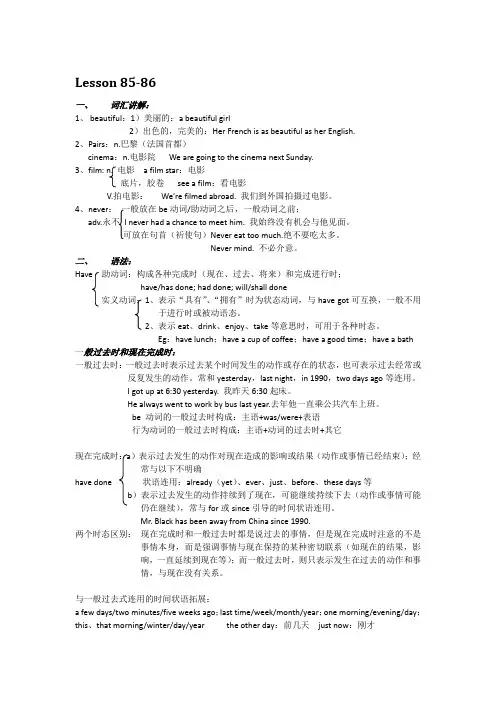
Lesson 85-86一、词汇讲解:1、beautiful:1)美丽的:a beautiful girl2)出色的,完美的:Her French is as beautiful as her English.2、Pairs:n.巴黎(法国首都)cinema:n.电影院We are going to the cinema next Sunday.3、film: n. 电影 a film star:电影底片,胶卷see a film:看电影V.拍电影:We’re filmed abroad. 我们到外国拍摄过电影。
4、never:一般放在be动词/助动词之后,一般动词之前;adv.永不I never had a chance to meet him. 我始终没有机会与他见面。
可放在句首(祈使句)Never eat too much.绝不要吃太多。
Never mind. 不必介意。
二、语法:Have 助动词:构成各种完成时(现在、过去、将来)和完成进行时;have/has done; had done; will/shall done实义动词:1、表示“具有”、“拥有”时为状态动词,与have got可互换,一般不用于进行时或被动语态。
2、表示eat、drink、enjoy、take等意思时,可用于各种时态。
Eg:have lunch;have a cup of coffee;have a good time;have a bath 一般过去时和现在完成时:一般过去时:一般过去时表示过去某个时间发生的动作或存在的状态,也可表示过去经常或反复发生的动作。
常和yesterday,last night,in 1990,two days ago等连用。
I got up at 6:30 yesterday. 我昨天6:30起床。
He always went to work by bus last year.去年他一直乘公共汽车上班。
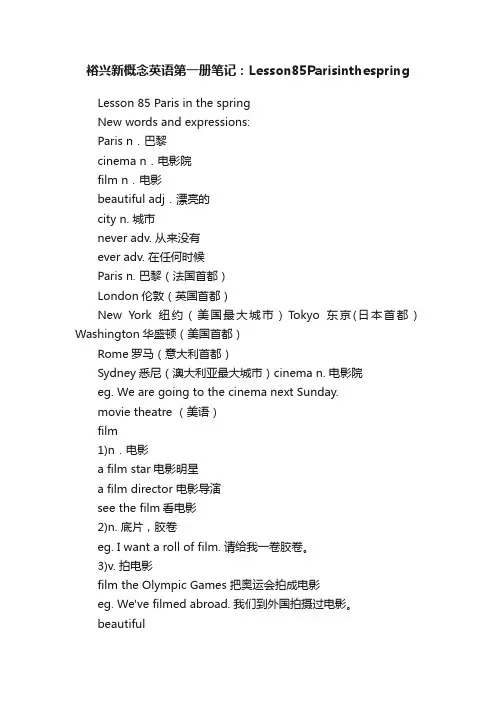
裕兴新概念英语第一册笔记:Lesson85ParisinthespringLesson 85 Paris in the springNew words and expressions:Paris n.巴黎cinema n.电影院film n.电影beautiful adj.漂亮的city n. 城市never adv. 从来没有ever adv. 在任何时候Paris n. 巴黎(法国首都)London伦敦(英国首都)New York纽约(美国最大城市)T okyo东京(日本首都)Washington华盛顿(美国首都)Rome罗马(意大利首都)Sydney悉尼(澳大利亚最大城市)cinema n. 电影院eg. We are going to the cinema next Sunday.movie theatre (美语)film1)n.电影a film star电影明星a film director 电影导演see the film看电影2)n. 底片,胶卷eg. I want a roll of film. 请给我一卷胶卷。
3)v. 拍电影film the Olympic Games 把奥运会拍成电影eg. We've filmed abroad. 我们到外国拍摄过电影。
beautiful1) adj. 美丽的a beautiful flowera beautiful woman2)很棒的,完美的eg. What a beautiful game it is! 多么棒的比赛!与同义词的区别:beautiful 表示接近和谐理想的美pretty 并非表示完美无缺的意思,而是着重表示“可爱”“令人怜爱”之意good- looking 指容貌美handsome 指容貌端正英俊的(多指男子)city n. 城市,都市a large city 大都市eg. What is the largest city in the United States?美国最大的城市在哪里?city life都市生活country life田园生活never adv. 决不,永不never通常置于一般动词之前,be动词,助动词之后。
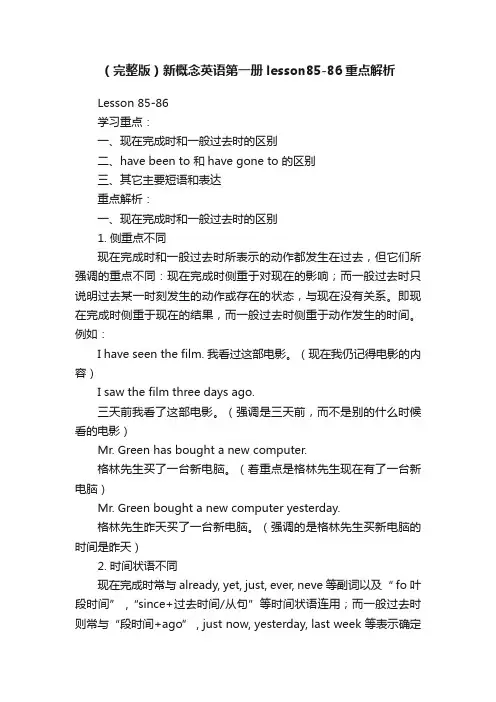
(完整版)新概念英语第一册lesson85-86重点解析Lesson 85-86学习重点:一、现在完成时和一般过去时的区别二、have been to 和have gone to 的区别三、其它主要短语和表达重点解析:一、现在完成时和一般过去时的区别1. 侧重点不同现在完成时和一般过去时所表示的动作都发生在过去,但它们所强调的重点不同:现在完成时侧重于对现在的影响;而一般过去时只说明过去某一时刻发生的动作或存在的状态,与现在没有关系。
即现在完成时侧重于现在的结果,而一般过去时侧重于动作发生的时间。
例如:I have seen the film. 我看过这部电影。
(现在我仍记得电影的内容)I saw the film three days ago.三天前我看了这部电影。
(强调是三天前,而不是别的什么时候看的电影)Mr. Green has bought a new computer.格林先生买了一台新电脑。
(着重点是格林先生现在有了一台新电脑)Mr. Green bought a new computer yesterday.格林先生昨天买了一台新电脑。
(强调的是格林先生买新电脑的时间是昨天)2. 时间状语不同现在完成时常与already, yet, just, ever, neve等副词以及“ fo叶段时间” ,“since+过去时间/从句”等时间状语连用;而一般过去时则常与“段时间+ago” , just now, yesterday, last w eek 等表示确定的过去时间的状语连用。
例如:She has lived here since two years ago.她两年前就住在这里了。
(暗含她可能还会在这里住下去)She lived here two years ago.两年前她住在这里。
(暗含她曾经住过,但现在不在这里了)He has been in the company for three years.他在这家公司已经三年了。
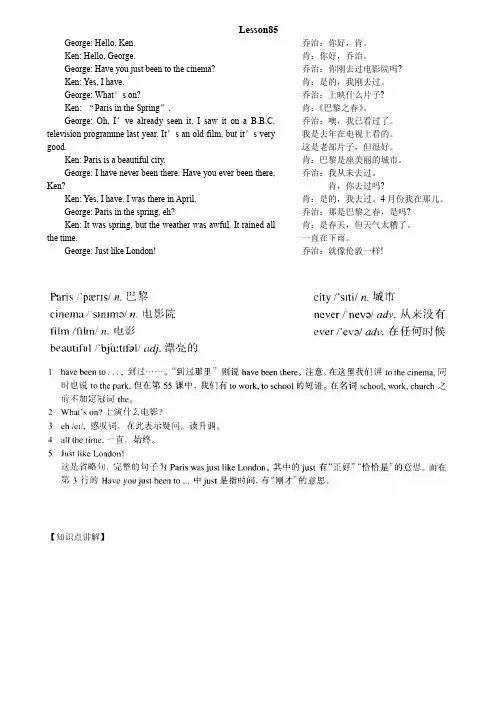
【知识点讲解】Lesson85George: Hello, Ken. Ken: Hello, George.George: Have you just been to the cinema? Ken: Yes, I have. George: What ’s on?Ken: “Paris in the Spring ”.George: Oh, I ’ve already seen it. I saw it on a B.B.C. television programme last year. It ’s an old film, but it ’s very good.Ken: Paris is a beautiful city.George: I have never been there. Have you ever been there, Ken?Ken: Yes, I have. I was there in April. George: Paris in the spring, eh?Ken: It was spring, but the weather was awful. It rained all the time.George: Just like London! 乔治:你好,肯。
肯:你好,乔治。
乔治:你刚去过电影院吗? 肯:是的,我刚去过。
乔治:上映什么片子? 肯:《巴黎之春》。
乔治:噢,我已看过了。
我是去年在电视上看的。
这是老部片子,但很好。
肯:巴黎是座美丽的城市。
乔治:我从未去过。
肯,你去过吗?肯:是的,我去过。
4月份我在那儿。
乔治:那是巴黎之春,是吗? 肯:是春天,但天气太糟了。
一直在下雨。
乔治:就像伦敦一样!。
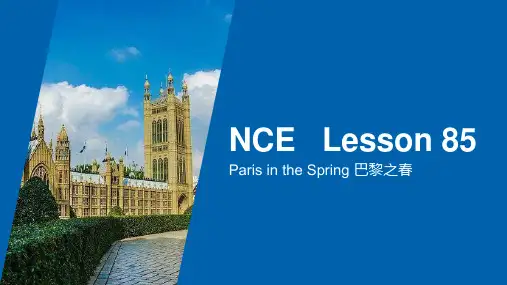
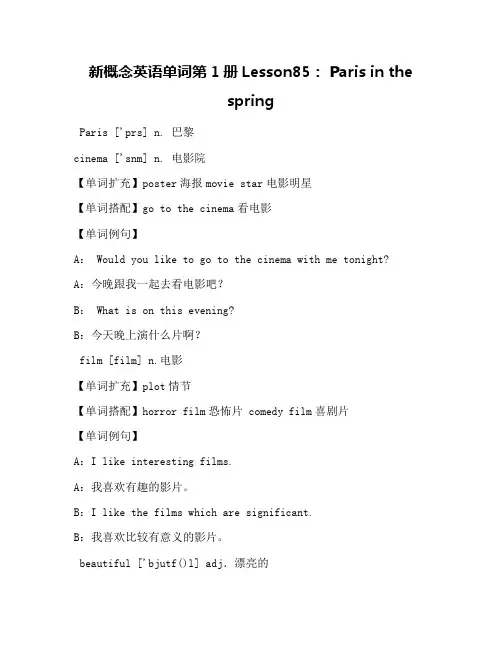
新概念英语单词第1册Lesson85: Paris in thespringParis ['prs] n. 巴黎cinema ['snm] n. 电影院【单词扩充】poster海报movie star电影明星【单词搭配】go to the cinema看电影【单词例句】A: Would you like to go to the cinema with me tonight?A:今晚跟我一起去看电影吧?B: What is on this evening?B:今天晚上演什么片啊?film [film] n.电影【单词扩充】plot情节【单词搭配】horror film恐怖片 comedy film喜剧片【单词例句】A:I like interesting films.A:我喜欢有趣的影片。
B:I like the films which are significant.B:我喜欢比较有意义的影片。
beautiful ['bjutf()l] adj.漂亮的【派生词】beautifully漂亮地【单词扩充】handsome溧亮的 good-looking漂亮的,美貌的【反义词】ugly难看的【单词例句】A:Would you show me that beautiful bonnet?A:把那顶漂亮的软绒帽拿给我看看好吗?B:Do you mean the red one?B:你是说那顶红色的吗?city ['st] n. 城市never ['nev] adv. 从来没有ever ['ev] adv.在任何时候。
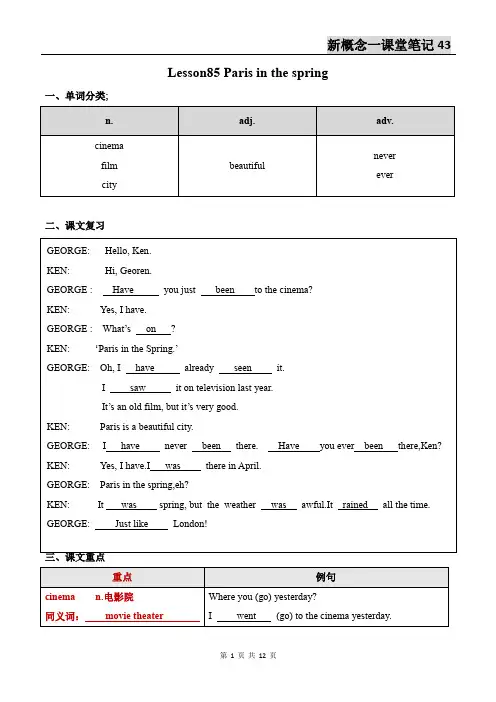
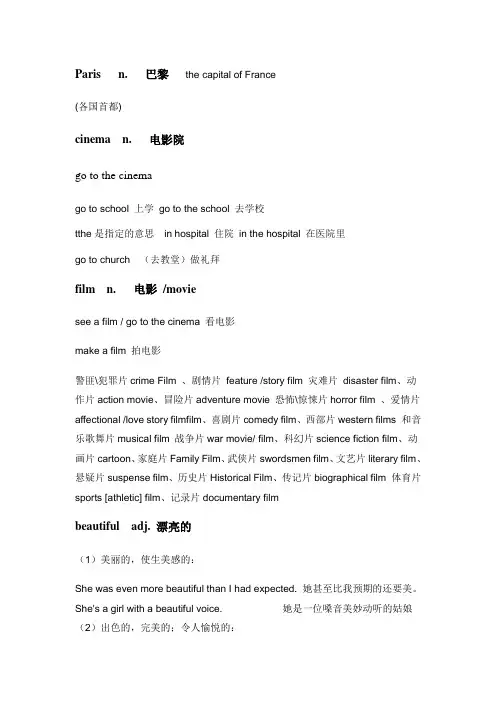
Paris n. 巴黎the capital of France(各国首都)cinema n. 电影院go to the cinemago to school 上学go to the school 去学校tthe是指定的意思in hospital 住院in the hospital 在医院里go to church (去教堂)做礼拜film n. 电影/moviesee a film / go to the cinema 看电影make a film 拍电影警匪\犯罪片crime Film 、剧情片feature /story film 灾难片disaster film、动作片action movie、冒险片adventure movie 恐怖\惊悚片horror film 、爱情片affectional /love story filmfilm、喜剧片comedy film、西部片western films 和音乐歌舞片musical film 战争片war movie/ film、科幻片science fiction film、动画片cartoon、家庭片Family Film、武侠片swordsmen film、文艺片literary film、悬疑片suspense film、历史片Historical Film、传记片biographical film 体育片sports [athletic] film、记录片documentary filmbeautiful adj. 漂亮的(1)美丽的,使生美感的:She was even more beautiful than I had expected. 她甚至比我预期的还要美。
She's a girl with a beautiful voice. 她是一位嗓音美妙动听的姑娘(2)出色的,完美的;令人愉悦的:Her French is as beautiful as her English. 她的法文说得和英文一样漂亮。
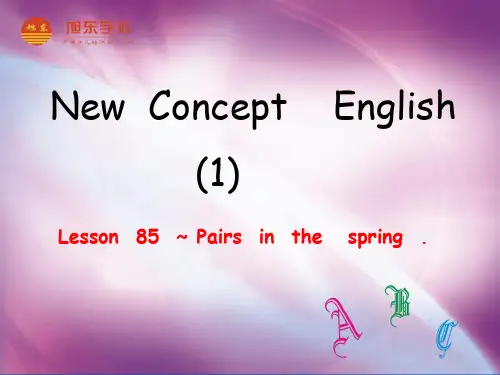
Lesson 85-86 Paris in the spring一、单词与短语Paris: n.巴黎;cinema:n.电影院;go to the cinema:去电影院看电影;film:n.电影;beautiful:adj.漂亮的;city: n.城市;never:adv.从来没有;ever:adv.在任何时候;二、短语、句型及语法1、Have you just been to the cinema?你刚去过电影院吗?在本句中需要重点掌握一个知识点:have been to与have gone to的区别及用法。
这两个短语都表示“到某地,去某地”,它们的主要区别是have been to指到过某处,现在已经回来了;have gone to 表示到某处去了,现在可能已经到达,可能还在途中,但是还没有回来。
例:Tom has been to china several times.汤姆去美国好多次了。
(现在已经回来了)Where is your brother?你哥哥去哪了?He has gone to Japan. 他去日本了。
(还没有回来)2、It rained all the time. 天一直在下雨。
在本句中我们重点掌握与time有关的几个常考短语的意思及用法:①on time:按时,准时;You must get to school on time.你必须准时到学校。
②in time:及时;He solved the problem in time.他及时解决了问题。
③at times:有时候,间或;She visited her grandma at times.她有时会去看看她奶奶。
④ahead of time:提前;He finished his homework ahead of time.他提前完成了作业。
⑤from time to time:时常;From time to time we visit our father′s farm.我们常常去参观爸爸的农场。
新概念第一册课文翻译及学习笔记【Lesson85、87、89】Lesson85 Paris in the SpringGeorge: Hello, Ken.Ken: Hello, George.George: Have you just been to the cinema?Ken: Yes, I have.George:What’s on?Ken:“Paris in the Spring”.George: Oh, I’ve already seen it. I saw it on a B.B.C. television programme last year. It’s an old film, but it’s very good.Ken: Paris is a beautiful city.George: I have never been there. Have you ever been there, Ken?Ken: Yes, I have. I was there in April.George: Paris in the spring, eh?Ken: It was spring, but the weather was awful. It rained all the time.George: Just like London!New Word and expressions 生词与短语Parisn. 巴黎cineman. 电影院filmn. 电影beautifuladj. 漂亮的cityn. 城市neveradv. 从来没有everadv. 在任何时候本文参考译文乔治:你好,肯。
肯:你好,乔治。
乔治:你刚去过电影院吗? 肯:是的,我刚去过。
乔治:上映什么片子? 肯:《巴黎之春》。
乔治:噢,我已看过了。
我是去年在电视上看的。
这是老部片子,但很好。
肯:巴黎是座美丽的城市。
乔治:我从未去过。
新概念英语第一册Lesson85~86单词及语法解析语法Grammar in usehave been与have gonehave been to a place表示曾经去过某地,但现在不在那个地方了;have gone to a place表示已经去某地了,现在在那个地方或正在去的路上。
如:George has been to Paris.乔治去过巴黎。
(他现在不在巴黎。
)George has gone to Paris.乔治去巴黎了。
(他在巴黎或去巴黎的路上。
)Have you ever been to America ?你去过美国吗?(对方不在美国境内。
)Has he gone to Washington D.C.?他去华盛顿了吗?(被提到的人有可能现在美国境内或在赴美途中。
)词汇学习Word studybeautiful adj.(1)美丽的,使生美感的:She was even more beautiful than I had expected.她甚至比我预期的还要美。
She’s a girl with a beautiful voice.她是一位嗓音美妙动听的姑娘。
(2)出色的,完美的;令人愉悦的:Her French is as beautiful as her English。
她的法文说得和英文一样漂亮。
He did a beautiful job of painting the desk.他油漆了书桌,活干得很漂亮。
Beautiful weather,isn’t it?天气晴朗宜人,对吗?新概念英语第一册Lesson87~88单词及语法解析语法 Grammar in use现在完成时的疑问式及否定式现在完成时的构成是 have/has+ 过去分词,因此其疑问式是将have/has 提到主语之前,否定式则在have/has后加上not即可如:Have they lived here for 10 years ?他们在这儿住了10年了吗?No,they haven’t lived here for 10 years没有,他们在这儿没有住了10年。
【知识点讲解】
Lesson85
George: Hello, Ken. Ken: Hello, George.
George: Have you just been to the cinema? Ken: Yes, I have. George: What ’s on?
Ken: “Paris in the Spring ”.
George: Oh, I ’ve already seen it. I saw it on a B.B.C. television programme last year. It ’s an old film, but it ’s very good.
Ken: Paris is a beautiful city.
George: I have never been there. Have you ever been there, Ken?
Ken: Yes, I have. I was there in April. George: Paris in the spring, eh?
Ken: It was spring, but the weather was awful. It rained all the time.
George: Just like London! 乔治:你好,肯。
肯:你好,乔治。
乔治:你刚去过电影院吗? 肯:是的,我刚去过。
乔治:上映什么片子? 肯:《巴黎之春》。
乔治:噢,我已看过了。
我是去年在电视上看的。
这是老部片子,但很好。
肯:巴黎是座美丽的城市。
乔治:我从未去过。
肯,你去过吗?
肯:是的,我去过。
4月份我在那儿。
乔治:那是巴黎之春,是吗? 肯:是春天,但天气太糟了。
一直在下雨。
乔治:就像伦敦一样!。